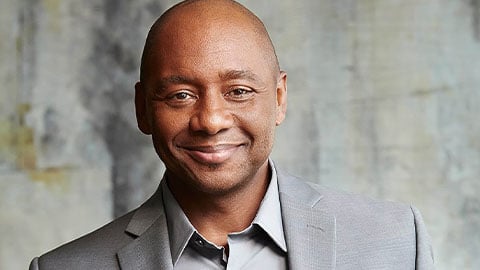The Grand Foyer at the John F. Kennedy Center for the Performing Arts teemed with patrons sporting gowns swirling against the carpeted floor and tuxedos announcing an auspicious occasion, signifying that there is no better place to spend your New Year’s Eve than at the Kennedy Center.

This year, DC Theater Arts joined the crowd and caught the first set of A Jazz New Year’s Eve: Branford Marsalis. A 70-minute, six-tune show that featured some of the best jazz musicians in the business. We were not disappointed as Marsalis on both soprano and alto saxophones, Joey Calderazzo on piano, Eric Revis on bass, and Justin Faulkner on drums switched back and forth between “songs you might not like and songs you definitely might like” teased Marsalis in his opening, as he launched the quartet into an original composition by Revis.
Revis’s composition set the mode for the musicians’ artistry and showmanship as Marsalis on soprano saxophone emitted eerie notes in a tune that commanded attention for its unwavering ability to ignore melody and drive home the sonic quality of the quartet’s engine: the percussive instruments. Calderazzo’s crescendo energized the entire band creating space for Faulkner to let go and work his drums with a dexterity that sounded like thunder rolling while also providing a much-needed arc to a tune that presented no melodic line for the listener to grasp.
The second tune, “A Conversation Among the Ruins,” which is a composition by Calderazzo, opened with the pianist banging out a languid melody and Marsalis joining him on soprano saxophone. This tune highlighted Calderazzo’s sensitivity to nuance with Faulkner emitting a light touch with the brushes. The tune conjured up images of earth-toned landscapes, conflict, and resolution.
The highlight of the evening was the 1930s tune “When I Take My Sugar to Tea” made popular by Nat King Cole and Frank Sinatra, and which Marsalis kept coming across while researching music for a score that he is composing for a movie about the blues artist, Ma Rainey. The quartet performed this tune in China before Thanksgiving to an approving audience, and they decided to share it with the audience at the Kennedy Center much to its approval.
The evening would not have been complete without “Auld Lang Syne,” which the quartet delivered with a distinctive nod to Marsalis’s New Orleans roots.
The quartet served up tastes of Erroll Garner; some new age sounds like in the opening bars of “Life Filtering from the Water Flowers,” a composition by Marsalis; and some standard 4/4 rhythms. Eclectic, innovative, pleasurable, and challenging: what you can always expect from this Marsalis brother is for your ear for music to become more refined, and your understanding of jazz to expand after any performance that his quartet delivers.
The consummate bandleader, Marsalis’s ease with the audience and ability to fall back and allow his band members to pepper the performance with displays of their own flavors to each tune created an intimacy in the 513-seat Terrace Theater that sometimes is missed with a small jazz band performing.
Marsalis reminded the audience that five years ago, he had to bow out of this New Year’s Eve performance due to illness, and Harry Connick, Jr. replaced him. A wild clapping in the audience acknowledged this and equally seemed to encourage Marsalis’s presence.
Whether Marsalis’s quartet plays next New Year’s Eve or not, the Kennedy Center provides a cogent space for spending New Year’s Eve. The Grand Foyer is only open to performance ticket holders after 9:30 p.m., so retain your ticket after the performance and enjoy the party. If you want to bring in the New Year in one of the most beautiful spaces in the city, don your gowns and tuxedos and make it happen.
Branford Marsalis played two performances only on Tuesday, December 31st, 2019. For tickets to future performances at the John F. Kennedy Center for the Performing Arts, call the box office at (202) 467-4600 or go online.




